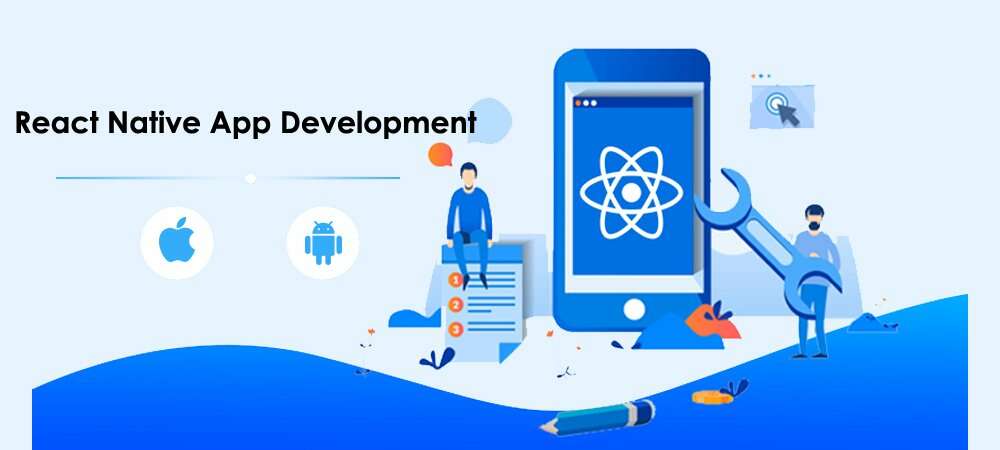Crafting Tomorrow's Apps: React Native App Development
You're on the edge of mobile app development and looking for the next big thing. React Native is one of the hottest platforms for building cross-platform apps that are fast, responsive, and look great on iOS and Android. In this article, we'll explore the world of React Native app development to see if it's the right fit for your next mobile project. With the ability to reuse code across platforms and access native features, React Native offers some compelling advantages. We'll break down the pros and cons so you can determine if React Native development services are what you need to build high-quality mobile apps today that will still be going strong tomorrow.
What Is React Native and Why Choose It?

React Native is a popular open-source framework for building native mobile apps using JavaScript. It allows you to use React to create native iOS and Android apps. Some of the main benefits of React Native are:
Cross-platform: You can develop apps for both iOS and Android using a single codebase. This means less time and effort spent building the same app twice for each platform.
Reusability: React Native apps reuse UI elements, logic, and modules across platforms. So you can build an app once and deploy it on both stores.
Faster development: You can build mobile apps faster using JavaScript and the React framework. Switching between Java for Android and Swift for iOS is unnecessary.
Live reloading: See your changes as you code. React Native lets you reload your app instantly without recompiling. This results in faster development cycles and more productivity.
React Native integrates seamlessly with native platforms. It renders using native UI components, so your app will look and feel like a native iOS or Android app. You get the best of both worlds - the native platform's capabilities combined with the productivity of the React framework.
Some popular companies using React Native include:
Facebook - Facebook created React Native, and they use it in their apps.
Instagram
Walmart
Uber Eats
Vogue
Bloomberg
In summary, React Native is a competent and helpful framework for mobile app development. Using a single codebase to build for both platforms can save time and money and lead to higher-quality apps. The future is bright for React Native development services and their apps.
Critical Benefits of React Native App Development
React Native is a popular open-source framework developed by Facebook that enables you to build native mobile apps using JavaScript. Some of the significant benefits of React Native app development include:
Cost Effective
With React Native, you can reuse up to 90% of your code between Android and iOS apps. This means you only have to build one app and deploy it to both platforms, significantly reducing development costs and time to market.
Increased Productivity
The hot reloading feature in React Native lets you instantly see the changes made to your app code. This allows you to build UIs, add features, and fix bugs faster. You can iterate quickly and ship features without recompiling the entire app.
Easy to Learn
If you know JavaScript, the learning curve for React Native is minimal. React Native uses the same fundamental UI building blocks as regular iOS and Android apps. So, if you have experience with either of those platforms, many of the concepts will be familiar. This makes it easy for developers to get up and running with React Native.
Access to Native Features
While React Native abstracts away many differences between iOS and Android, it still allows you to access fully native functionality. You can build parts of your app using Objective-C, Swift, Java, or Kotlin and then expose that code to JavaScript using the React Native bridge. This gives you the best of both worlds.
Vibrant Community
React Native has a very active and helpful open-source community. If you get stuck while building your app, you can search for solutions on Stack Overflow or ask questions in the Reactiflux Discord channel. The community constantly builds and shares valuable resources, tutorials, and libraries to help other developers.
React Native is a powerful option if you want to build high-quality, native mobile apps efficiently and cost-effectively. The framework lets you leverage your JavaScript and web skills to build for iOS and Android, all while accessing fully native functionality.
React Native vs Native App Development
When building mobile apps, a big question is whether to use React Native or native technologies like Xcode (iOS) and Android Studio (Android). Both options have their pros and cons, so let's compare them.
Native apps are built using the native languages of each platform - Swift or Objective-C for iOS and Java or Kotlin for Android. This allows for maximum performance and leveraging of device-specific features. However, developing native apps requires maintaining separate codebases for iOS and Android, which can be time-consuming and expensive.
React Native, on the other hand, lets you build mobile apps using JavaScript. It renders native UI components at runtime, so your app will look and feel like a native app. You can reuse much of the same code across iOS and Android, significantly reducing development time and cost. Performance may be slightly lower than native apps, and accessing some device features can be more difficult.
For many apps, React Native offers an outstanding balance of native feel and cross-platform efficiency. Some top companies using React Native include Facebook, Instagram, Tesla, Walmart, and Bloomberg.
Some factors to consider when choosing between React Native and native app development include:
• Performance needs - Choose native if maximum performance and hardware optimization are required. React Native is still fast, but Native is faster.
• Platform-specific features - Some device features may only be accessible in native languages. If using many advanced features, native may be better.
• Code reusability - With React Native, you can reuse most of your code across iOS and Android. This can save a lot of time and money.
• Developer experience - React Native uses familiar web technologies, so it's easy for web and JavaScript developers to pick up. Native languages have a steeper learning curve.
• Time to market - React Native can get your app to market faster since you only have to build one app. A native approach requires building two separate apps.
• Cost - The ability to reuse code and ship one app instead of two can significantly lower development costs. React Native is often more budget-friendly.
In the end, evaluate your priorities and needs to determine if the pros of React Native outweigh the benefits of a native approach or vice versa. For many use cases, React Native offers an ideal solution to build high-quality, cross-platform mobile apps.
Hiring a React Native Development Company
When looking to build a mobile app, React Native is an excellent framework to consider. However, developing a React Native app in-house requires a highly specialized team with expertise in React, React Native, iOS, Android, and more. For most businesses, hiring a React Native development company is the most innovative approach.
A React Native development company has teams of engineers and developers with years of experience building React Native apps. They stay up-to-date with the latest updates to React Native, iOS, and Android. This means they can create apps utilizing the newest features and capabilities, keeping your app looking and functioning great.
Some key things to consider when hiring a React Native development company:
Experience building React Native apps. Look for companies with experience building apps similar to yours. Review examples of their React Native work.
Knowledge of iOS and Android. React Native allows you to build for both platforms, so the company should have expertise in native iOS and Android development as well.
Communication and collaboration. The company should emphasize communication, setting clear expectations, timelines, and milestones. They should be able to work closely with your team.
Support and maintenance. Once your app launches, the company should offer support and maintenance services to fix any issues, make updates, and add new features.
Affordability. React Native development companies charge varying rates depending on location and experience. Look for a company that fits your budget while still meeting your needs.
Reviews and reputation. Check online reviews from the company's clients to determine their reputation and the quality of service they provide. Look for mostly positive reviews mentioning React Native and mobile app development.
Partnering with an experienced React Native development company helps ensure your mobile app is built securely, efficiently, and effectively. Considering these key factors, you can find a reputable company to bring your React Native app idea to life.
React Native App Development Services FAQs
Now that you understand the benefits of React Native for building mobile apps, you probably have some questions about the development process. Here are some of the most frequently asked questions about React Native app development services:
How long does it take to build a React Native app?
The timeline for building a React Native app can vary depending on the app's complexity, but you can expect 3-6 months for a high-quality, production-ready app. The cross-platform capabilities of React Native allow you to build both iOS and Android apps simultaneously, saving significant time over building native apps separately.
How much does it cost to develop a React Native app?
React Native app development costs between $50,000 to $150,000 for a full-featured app. The final price will depend on the complexity, number of screens, and integrations required. You can save 30-50% on development costs compared to building separate native iOS and Android apps.
What skills does a React Native developer need?
React Native developers should have experience with the following:
JavaScript
React Native framework
iOS and Android platforms
REST APIs
Git version control
Continuous integration tools
They should also be comfortable with JavaScript tools like Babel, webpack, and npm. Strong communication and problem-solving skills are essential for collaborating with designers and product managers.
How do I hire React Native developers?
Here are some tips for hiring React Native developers:
•Post jobs on sites like Stack Overflow, GitHub, and LinkedIn. •Test candidates' React Native knowledge and coding skills. •Check their portfolio and experience developing real-world React Native apps. •Assess soft skills by conducting video interviews. •Check references from past employers.
•Consider hiring freelance or contract React Native developers to save costs. •Work with a software engineering staffing agency to help you find and hire qualified candidates.
What is the future of React Native?
React Native has a very bright future. It is backed by Facebook and used by major companies like Facebook, Instagram, Skype, and Walmart. The framework is constantly improving to support the latest iOS and Android features. As more people adopt the framework, the talent pool will grow, and more open-source libraries will become available.
Conclusion
In conclusion, React Native emerges as a potent solution for mobile app development, blending efficiency, cost-effectiveness, and native performance. Its utilization of JavaScript for cross-platform development, alongside access to native features, makes it appealing for businesses aiming to craft high-quality mobile applications swiftly.
React Native streamlines development by enabling a single codebase for iOS and Android, significantly reducing time and costs. Its live reloading feature enhances productivity, allowing instant visualization of code changes and swift iteration.
Moreover, React Native's accessibility, supported by a vibrant community and extensive documentation, makes it attractive to JavaScript and web developers. This accessibility, combined with seamless integration with native functionalities, ensures businesses can leverage existing resources while delivering polished, feature-rich mobile experiences.
Compared to native app development, React Native offers a balance between native feel and cross-platform efficiency. While native development may offer maximum performance, React Native provides a compelling alternative with enhanced efficiency and lower development costs.
Partnering with experienced development companies further enhances React Native's potential, ensuring secure, efficient, and effective app development. As React Native continues to evolve with support from industry giants and a growing ecosystem, it remains poised to shape the future of cross-platform application development.











Please login or create new account to add your comment.